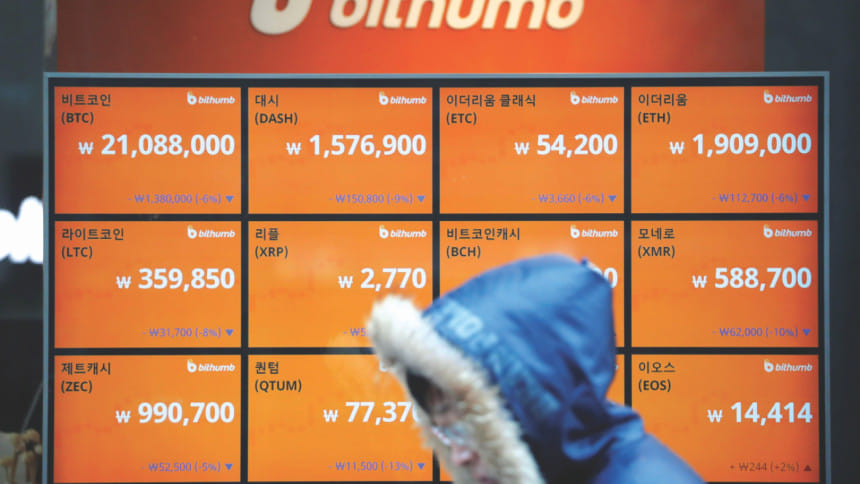Bitcoin and the future of cryptocurrency

Bitcoin is a trending topic today due to the surge in its value in comparison to traditional currencies. The peak value of bitcoin was staggeringly high—several times the per capita economic output of Bangladesh. In this context, an obvious question would relate to the relevance and applicability of bitcoin in our lives.
However, first, it is important to understand what bitcoin is. Bitcoin is a cryptocurrency and a worldwide payment system that functions on the blockchain technology. The publicly distributed ledger created by blockchain technology requires a cryptocurrency to conduct transactions. Bitcoin is one of those cryptocurrencies. While there are many cryptocurrencies available for use, bitcoin has emerged as the most popular around the world.
If bitcoin is to be considered a currency like the Bangladeshi taka, we would need to know how to use it. The users of bitcoin require wallets for storing their coins. The wallets can be physical—a small hardware device, or software-based—stored in a computer. In either case, the currency can only be put to use via computers connected to the Internet. Further, smartphones can work as substitutes for computers. Users can opt to keep a part of the ledger with them in their computers if they intend to perform complex transactions.
The users can also play the role of transaction verifiers. In the world of bitcoin, such users are called miners. Miners verify transactions and vote to validate them and make the entries permanent. Miners are usually rewarded by bitcoins freshly mined out of the system after fulfilling predefined criteria, and the amount is determined by the computer algorithm.
The role of bitcoin miners overlaps with that of central banks in some areas. For example, we have central banks to print and issue currencies in our existing economic system. Their promise of a currency bearing a certain value is usually guaranteed by the governments supporting them. As a result, the central banks enjoy the privilege of printing money and managing inflation according to their economic objectives. In the world of bitcoin, this is the job of a computer algorithm.
Central banks are authorised by the statutes of their countries. Bitcoin seeks to decentralise part of their role among the general public spread across different countries. Bitcoin also aims to make inflation predictable by letting the algorithm mine and create new coins. As a result, the risk of value depreciation due to inflation is minimised. For the first time in the long history of fiat money, bitcoin has successfully demonstrated that currency regulation can be decentralised and democratised—a revolution that would not have been possible without the underlying technologies.
However, there are certain limitations on the functionality of bitcoin. Central banks manage the supply of money using various economic techniques, such as interest rates, with the aim of catalysing economic growth and keeping commodity prices under control. Bitcoin lacks that feature due to its decentralised structure and algorithmic control. The total supply of bitcoin today is estimated to be around 16.80 million, according to various estimates. Its supply is increasing every day but is limited by the pace of mining, and can increase up to 21 million. As a result, its price increases in the currency exchanges depending on the pace of its popularity and demand. Compared to this, the supply of the taka (M1) is about 2.27 trillion in value, according to the website data of Bangladesh Bank. The central bank can increase or decrease its supply to manage economic parameters.
The limited supply of bitcoins restricts its practical use in everyday life. Daily life requires money in comprehensible units, with adequate supply and public acceptance. Central banks do this job for their own currencies within their jurisdictions. Bitcoin needs to evolve with technological advancements and build these attributes over time.
Given the high price of bitcoin, it may be seen as a commodity such as gold, silver or other precious metals whose supply is limited. The prices of commodities are cyclic in nature—they rise and fall in the market. For centuries, commodities like gold or silver have proven to be of great value due to their public acceptability as valuables. On the other hand, bitcoin has been operational for just about nine years and it is too early to comment on its long-term prospects.
Across the world, the popularity of bitcoin has been increasing. It is also being used for economic transactions. This creates challenges relating to the enforcement of laws. Due to bitcoin's borderless character, law enforcement agencies are struggling to monitor illegal activities involving bitcoins. Bitcoin is not recognised as legal tender in many countries and is, therefore, not suitable for use in buying or selling activities. Tax authorities are divided on whether a bitcoin transaction is a currency transaction or a commodity trading. Regulators may take some more time to catch up with this technological advancement.
With advancements in technology, cryptocurrencies are more likely to become the mainstream currency for transactions in the coming years. Central banks may decide to circulate their own cryptocurrencies with their proprietary algorithms and controls and may choose to decentralise the management of cryptocurrencies among the public through a shared ledger while retaining some regulatory controls with themselves. Alternatively, they may decide to endorse bitcoin along with some mechanisms for cross-border collaboration and economic control.
Further, private organisations can enhance their customer loyalty management programmes by using cryptocurrencies. For example, the reward points of a loyalty programme may be substituted with a tradeable cryptocurrency. Technological advancements can make this possible in the near future.
The writer is a partner at PwC. The views expressed here are personal.

 For all latest news, follow The Daily Star's Google News channel.
For all latest news, follow The Daily Star's Google News channel. 







Comments